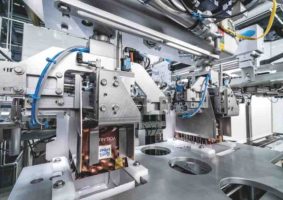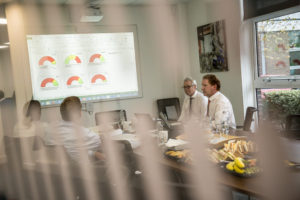Focus: Schubert Packaging Machines UK operations record sales upturn

Delivering packaging machinery that offers flexible, efficient solutions for industry is of key importance in financially challenging times, as Mark Stepney, managing director of Schubert UK exclusively explains to editor Neill Barston.
Over the course of nearly two decades, Schubert Packaging Machines has steadily built-up a strong presence in the UK with its subsidiary operating from Birmingham.
As the division’s managing director Mark Stepney explains, he’s spent a considerable spell with the company, and the events of the past year amid the pandemic are among his most challenging yet. With the coronavirus crisis having turned the world upside down, the resulting turbulence across multiple sectors of industry has offered the sternest of tests across manufacturing, logistics and retailing operations around the globe.
However, the food and drink sectors have, as essential industries, shown a good deal of resilience, and this is being reflected in equipment sales, including for Schubert’s packaging machinery.
As the business reports, its lines have been much in demand, as Confectionery Production has reported in recent months, the market for sweets, snacks and bakery ranges has remained buoyant amid the pandemic. Consequently, it seems Schubert, which has staked its reputation on high quality German designed and built robotics-enhanced packaging lines that offer a strong degree of flexibility for customers, is reportedly weathering the wider economic storm in notable fashion.

“Our order intake in 2020 represented a 500 per cent increase on 2019, and in 2021 we’ve already achieved 35 per cent of this year’s target by the end of January. Confectionery and bakery accounts for more than 90 per cent of that figure,” notes Stepney (pictured below), who says it’s been an ‘extraordinary year’ for machine sales, which he believes is a testament to the determination of its relatively small, but dedicated team. He says that like all companies, the firm has adopted a stringent approach to monitoring events with regard to covid – thankfully none of its staff have been directly affected by the virus so far.

As he acknowledges, there’s no room for complacency, with the business keeping a strong eye on industry developments including external factors such as Brexit, which is causing logistics issues for many spheres of industry. Fortunately for Schubert’s UK division, it’s an issue it is managing to navigate comparatively well, operating in Britain as a sales and service operation, sourcing lines directly from Germany.
In doing so, as the MD notes, the business is able to directly prove the location of its sourcing, minimising potential additional customs tax implications under the complex ‘rules of origin’ system that now exists between the UK and mainland Europe. He believes that with many companies in the UK now potentially having to re-evaluate some of their ingredient sourcing to more localised solutions in light of Britain’s exit from the EU, this in fact offers some significant business opportunities. Despite such positivity, the company has undoubtedly faced its share of tests in tackling operating conditions.
“The past year has been as much a shock to us as it was to everyone else in the industry, and it took us a few weeks to find our feet. “But this business is a sales and service platform, so it’s all about the people – and they’ve rallied really well, and we have put a covid task team together to understand how we could continue to run the business,” explains Stepney, who stresses the wellbeing of his team, including its frontline engineers, remains a crucial priority.

Beyond social distancing measures and structural re-organisation through its IT operations, he says it’s been very much a case of maintaining its focus on meeting customer demand.
TLM lightline success
As Stepney enthuses, within the company’s core range of packaging lines, there has been a notable interest in its recently introduced lightline packaging system. Since its introduction several years ago, it has attracted global attention, in being devised for firms seeking to cost effectively automate standard packaging tasks with reduced format as well as packaging variants.

This high performance, pre-configured range operates with low energy consumption, with its short delivery time and reduced installation cost proving a major point of distinction. Significantly, the company now offers three preconfigured machine types: the lightline Cartonpacker, the lightline Flowpacker and the lightline Pickerline, which are capable of taking on straightforward automised production tasks.
As the divisional director reveals, the gains achieved during the past year have seen plenty of fresh enquiries, with a total of around 80 per cent of its sales being made to new customers.

While he says equipment investment decisions are typically taking a fair period of time to materialise into full orders, it seems companies are realising the ultimate benefits of automating.
This was reflected in a study two years ago by industry manufacturing body Make UK, which highlighted the fact that despite Britain traditionally being noted for its engineering and technology skills, the UK actually lagged behind many of its European neighbours in adopting automated solutions. “I think the UK is waking up to the fact it has to move forward with automation, and we have been especially marketing our lightline packaging line range with our customers.
The key from a retail operations’ perspective, it is about how quickly they can get their products to market, so linked to this is how long it takes packaging equipment to be installed for manufacturers. “With our larger ranges, this can take around 11 or 12 months, but with the lightlight it is only around six or seven months, and it still has all the same aggregates as our other lines. The difference is that it is in the form of a preconfigured machine,” explains Stepney, who enthuses that one of its standout strengths is in terms of speed of changeovers.
These can take as little as 20 minutes – compared to a number of hours for conventional, less advanced systems. Clearly, the company’s success in the UK has been one that has gathered pace over time, but it’s a story that’s very much one of continual improvement.
“I have been here with Schubert for 12 years now, and there were seven of us when I started out. We’ve doubled that to 14 in the team, and our turnover has quadrupled, building up a number of key strongholds. So, it’s been really nice to see the evolution of the business,” he notes of conditions as they continue to show an encouraging upward trajectory in the region.



